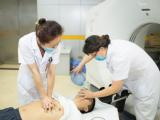Editor's note: This story was revised Apr 1, 2004, to include additional information from the National Institute of Allergy and Infectious Diseases.
Mar 31, 2004 (CIDRAP News) – An experimental vaccine developed by federal researchers prevented the SARS (severe acute respiratory syndrome) coronavirus from reproducing in laboratory mice, according to a report published in the Apr 1 issue of Nature.
Gary J. Nabel of the National Institute of Allergy and Infectious Diseases (NIAID), one of the authors of the study, called the vaccine "a critical first step towards developing an effective human SARS vaccine." Nabel was quoted in a news release from the National Institutes of Health, of which the NIAID is a part.
The NIAID noted that most vaccines use killed or weakened forms of a whole virus or bacteria. But the new vaccine contains a fragment of SARS virus DNA that codes for a protein on the outer surface of the virus, the agency said. The protein helps the virus enter host cells. Because the DNA in the vaccine codes only for the protein, it can't cause infection by itself.
The investigators tested two versions of the vaccine in mice, the NIAID said. The two differed in how much genetic material was removed from the original piece of DNA. Two groups of five mice received three doses of one or the other form of the vaccine over 6 weeks. A control group of five mice received an inactive vaccine.
Thirty days later, all the mice were exposed to the SARS virus, the NIAID said. "After two days, the mice in the control group had very high levels of SARS virus in their lungs. The vaccinated mice had nearly negligible levels of SARS virus in their lungs." The controls had a million times as many virus particles as the vaccinated mice, the agency said.
The vaccine caused the mice to generate both antibodies and specialized T cells to defend against the SARS virus, the NIAID reported. But the researchers found that the antibodies alone caused the dramatic reduction in virus in the vaccinated mice.
NIAID Directory Anthony S. Fauci, MD, noted that the SARS coronavirus was identified only a year ago. "This [vaccine] research was done in a remarkably short period of time, a testament to the serious attention and great cooperation the public health community has displayed in response to SARS," he said in the news release.
In their report in Nature, the authors of the study say that DNA vaccines have proved successful in various animal experiments with several infectious diseases. But they add, "This approach has only recently been used in human studies, and its potential to protect against human diseases has yet to be established." In addition, mice are an imperfect model for SARS infections in humans. (Another recent NIAID study showed that unvaccinated mice could be infected with the SARS virus, but they developed antibodies that blocked viral replication.)
Consequently, the report says, it will be important to test whether the experimental SARS vaccine generates an immune response in humans. If the response is unsatisfactory, it could be augmented by using inactivated viral vaccine candidates or other techniques, the researchers say.
The NIAID said Vical, Inc., San Diego, is making a highly purified SARS vaccine that will be suitable for human clinical trials. Nabel, who directs the NIAID Vaccine Research Center, said the vaccine is one of those used in the mouse experiment. Vical is working under a contract with the NIAID.
Nabel told CIDRAP News the NIAID is also supporting the development of other SARS vaccines, including inactivated vaccines being produced by Baxter and Aventis. "They aren't quite as far along, but they will be coming down the road, and there are a variety of other products being supported by NIAID," he said.
Other SARS vaccines are being developed elsewhere. For example, Chinese health officials announced in January that they would launch the first human trial of a SARS vaccine developed in China. Also in January, it was reported that the University of British Columbia had developed three candidate SARS vaccines, which were to be tested in animals at the Southern Research Institute in Birmingham, Ala.
Yang Z, Kong W, Huang Y, et al. A DNA vaccine induces SARS coronavirus neutralization and protective immunity in mice. Nature 2004 Apr 1;428(6982:561-4 [Abstract]
See also:
NIAID news release
http://www.niaid.nih.gov/news/newsreleases/2004/Pages/sarsvax.aspx




















